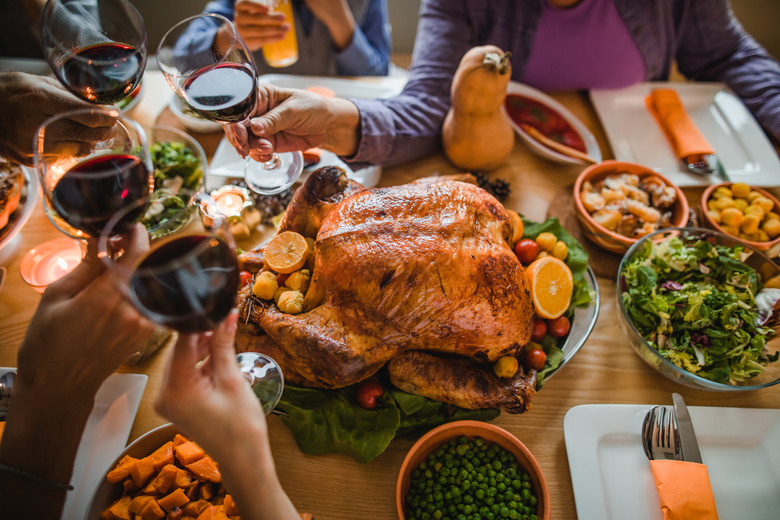Does Thanksgiving Turkey Really Make You Sleepy?
If your Thanksgiving ritual involves passing out on the couch after a meal, you already know that a feast with all the trimmings makes you tired. But did the turkey sign your one-way ticket to snoozeville?
The oft-repeated story is that L-tryptophan – one of the many amino acids found in meat – in turkey triggers sleepiness in your brain. And that explains why you need to catch a nap after your feast.
But that's not really how it works. And that sleepiness you feel has more to do with the overall meal than the turkey itself. Here's the deal with the tryptophan in turkey – and what's really causing your post-turkey drowsiness.
Tryptophan, Turkey and Sleep
Tryptophan, Turkey and Sleep
Let's start with the basics: Turkey is a great source of protein in your diet. And since every protein is made up of amino acids, it's also a great source of amino acids. That includes tryptophan, as well as any other essential amino acids that your body needs to function. Collectively, these amino acids help your body maintain and repair tissues, keep your immune system revving, and carry out a bunch of other physiological functions.
One of those other physiological functions is helping your body create hormones. And tryptophan helps your body produce serotonin, a "feel-good" brain hormone that's also important for healthy sleep.
So on paper, the idea that turkey makes you drowsy kinda makes sense. By providing more tryptophan, turkey theoretically helps your body make more serotonin, then that serotonin sends you to sleep. It's easy to see why the myth spread so far, right?
But There's a Catch – Turkey Isn't a Unique Source of Tryptophan
But There's a Catch – Turkey Isn't a Unique Source of Tryptophan
While it is true that turkey supplies tryptophan, it's not even close to the only food to do so. Any protein derived from animal sources (beef, chicken, fish, eggs, dairy....you get the idea) supplies all the essential amino acids, including tryptophan.
So if just getting tryptophan from your diet was enough to make you tired, you'd need a nap after your morning scrambled eggs or mid-afternoon Greek yogurt, too. In fact, turkey is lower in tryptophan than other meats, like chicken, that don't have a sleep-inducing reputation.
What's more, other amino acids in turkey could actually have a stimulant effect on your brain. Tyrosine, for example, helps with the production of epinephrine, or adrenaline – a hormone that makes you feel the opposite of sleepy. And since you probably don't feel like heading out for a run after your Thanksgiving feast, it's obvious that no one amino acid in your meal can single-handedly decide how you feel after.
Here's Why Your Thanksgiving Feast Really Makes You Sleepy
Here's Why Your Thanksgiving Feast Really Makes You Sleepy
Instead of looking at the micro-level of amino acids and how they might affect your brain, think big picture. The mountains of calories, carbohydrates, proteins and fats in your Thanksgiving meal are the reason you need a nap – not the tryptophan in turkey.
The reason? Digestion uses up a lot of energy: between 3 and 10 percent of the total calories you ate. When you overeat, your digestive system starts working overtime to break down that massive meal. Your body also diverts more blood flow to your digestive system for extra support – which means slightly less blood is diverted to your brain to keep you feeling alert.
Given that the average Thanksgiving meal contains 3,000 calories and over 200 grams of fat – more than your entire daily allowance – it's no wonder you want to snooze.
By all means, take all the power naps you want (it's a long weekend, and you deserve it). Just don't blame the bird!
Cite This Article
MLA
Tremblay, Sylvie. "Does Thanksgiving Turkey Really Make You Sleepy?" sciencing.com, https://www.sciencing.com/does-thanksgiving-turkey-really-make-you-sleepy-13715432/. 20 November 2018.
APA
Tremblay, Sylvie. (2018, November 20). Does Thanksgiving Turkey Really Make You Sleepy?. sciencing.com. Retrieved from https://www.sciencing.com/does-thanksgiving-turkey-really-make-you-sleepy-13715432/
Chicago
Tremblay, Sylvie. Does Thanksgiving Turkey Really Make You Sleepy? last modified March 24, 2022. https://www.sciencing.com/does-thanksgiving-turkey-really-make-you-sleepy-13715432/
